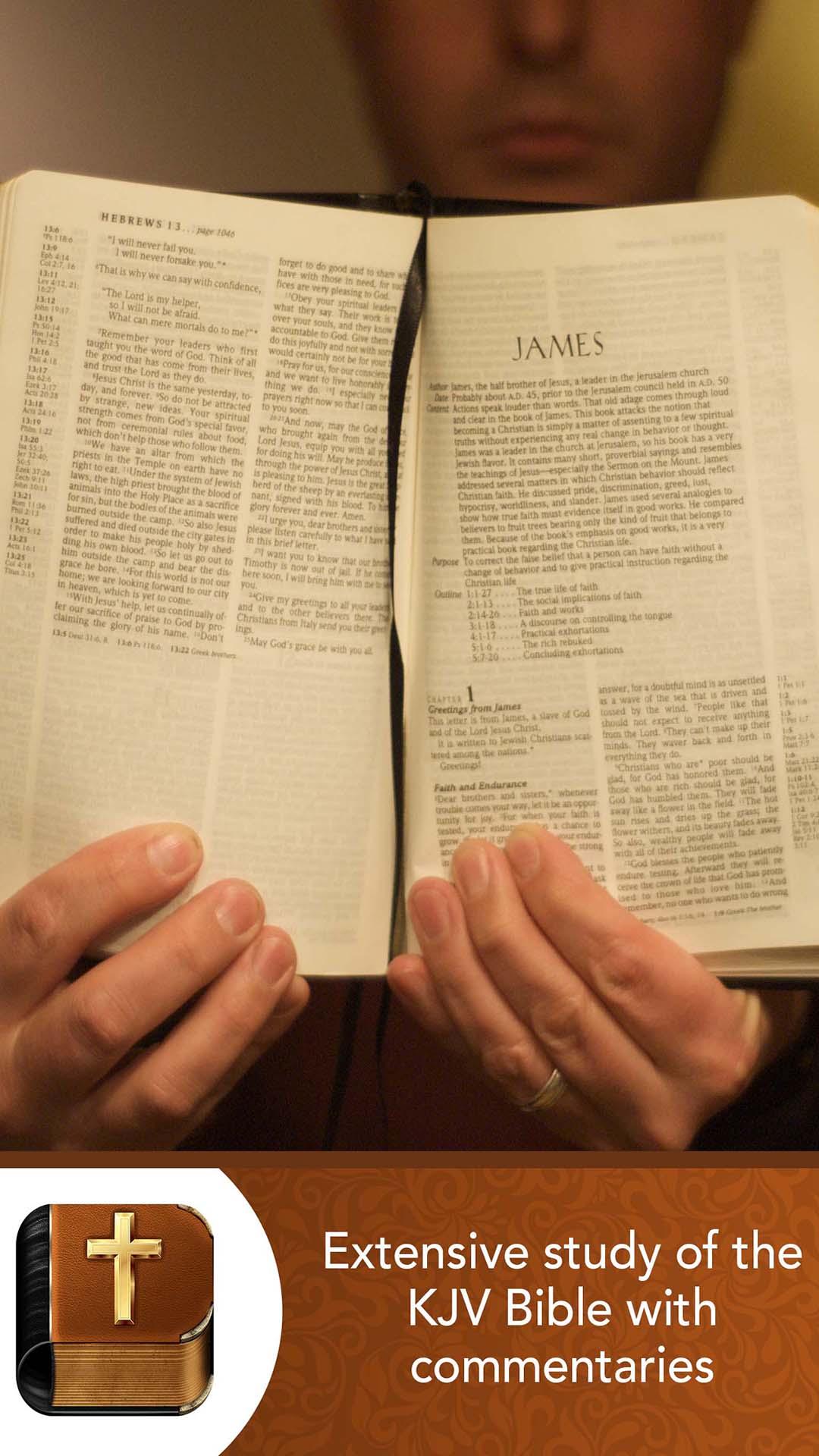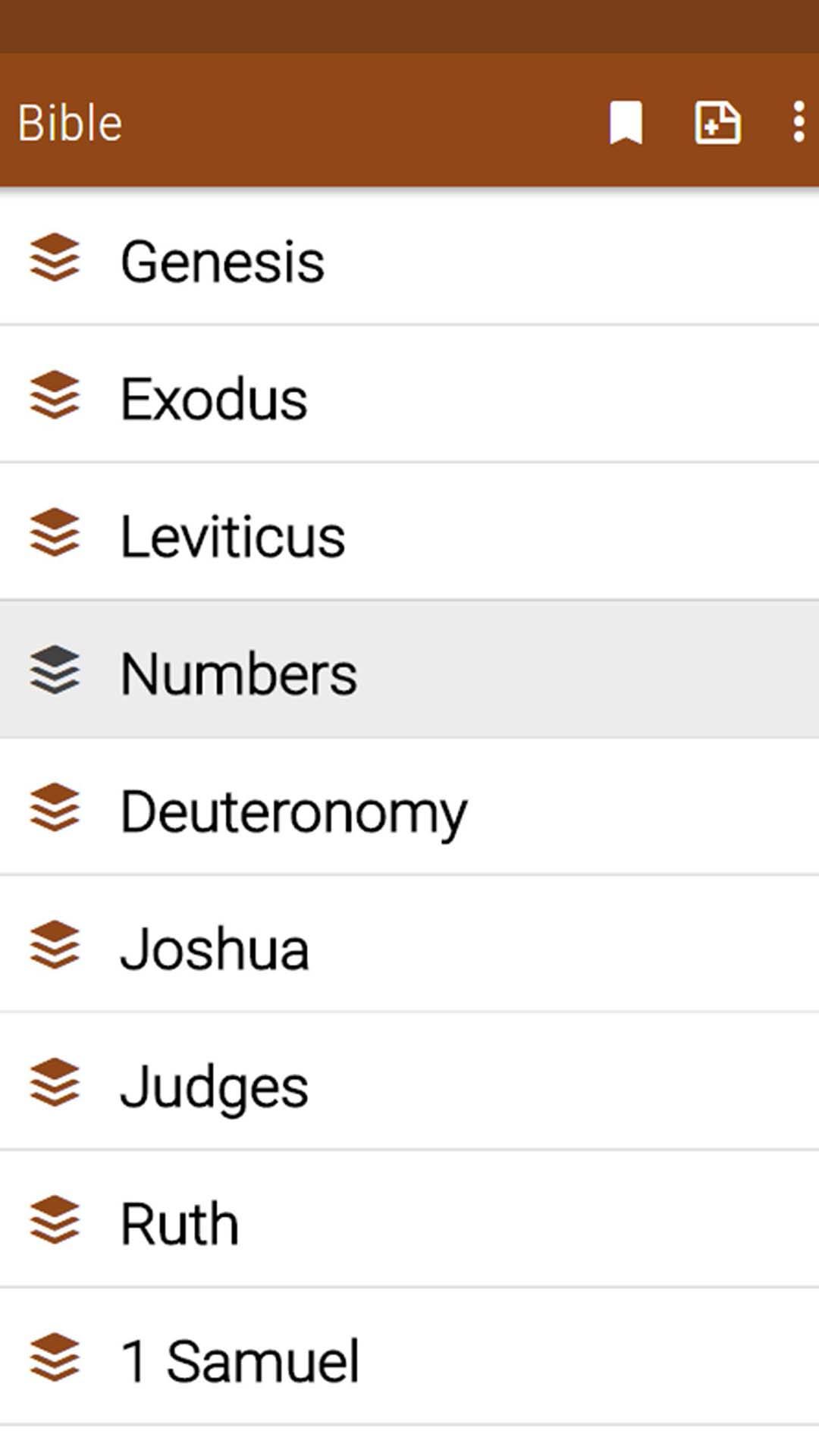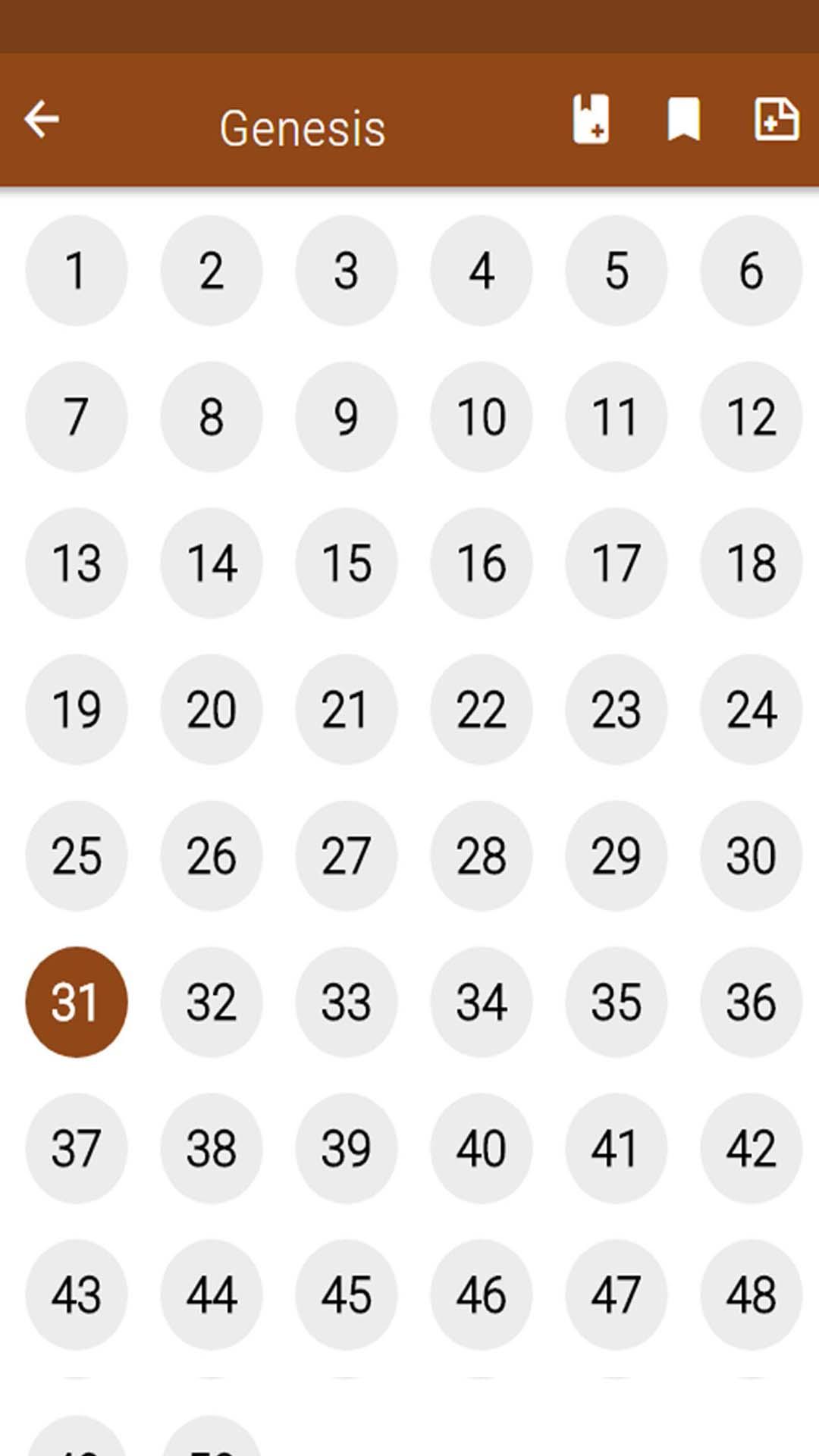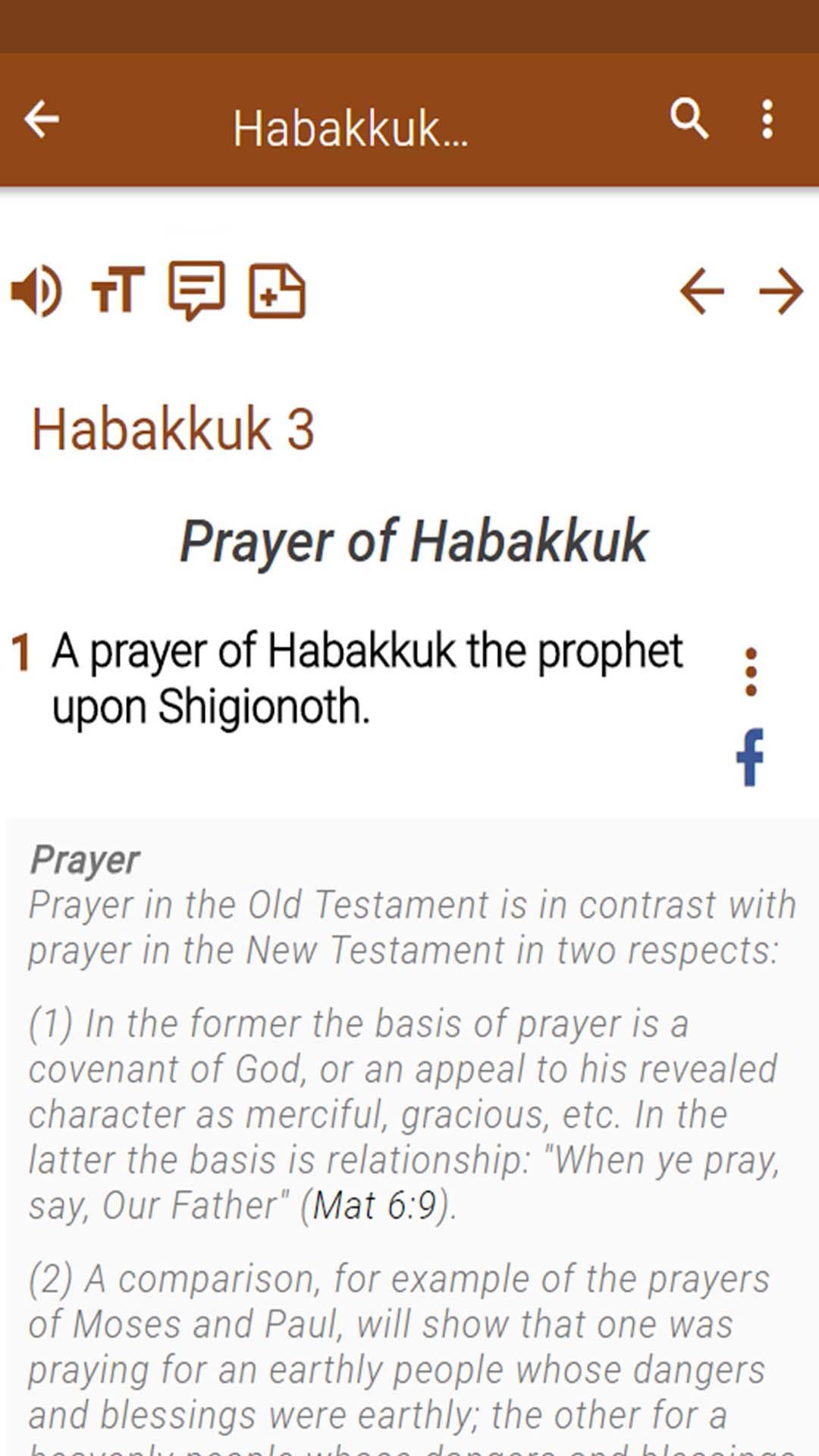Bible with commentaries app, to study the Holy Bible, with audio and offline.
“Bible with commentaries” free app is a comprehensive study Bible (King James Version) that contains text accompanied with exhaustive explanations as well as in-depth commentaries, which makes it a perfect app for anyone looking to indulge themselves in a thorough reading of the Bible
This amazing free app includes the King James Version, which is supplemented with commentaries of the theologian Cyrus Ingerson Scofield.
The King James Version of the Bible is the best English translation of the Bible, which is comprised of a total of 39 books, namely the Old Testament, the 14 books of the Apocrypha and the 29 books of the New Testament. Its translation was authorized by King James I of England for the Church of England, a process that begun in 1603 and came to fruition in 1611.
The “Bible with commentaries” app comes with numerous features that make it easier to use and effortless to get used to. Being free and offline, it is accessible to everyone, no matter where they might be. You can read as well as listen to the audio, and customize the app according to your needs.
Not only this, since it is a study bible, the app contains sub-headings in each chapter and also allows for cross-referencing, meaning the verses pertaining to the same topic are interlinked.
Verses are accompanied with extensive explanations as well as theologian Cyrus Ingerson Scofield’s commentaries, ensuring that each verse can be properly analyzed and understood. Some more features of the app include:
✔️ FREE and ACCESSIBLE
* Completely free
* No internet connection required
* Text, as well as audio, is available
✔️ ADJUSTABLE
* Change audio settings like volume, speed and tone
* Modify text size
* Choose night mode or day mode
✔️ IMMERSIVE
* Save and bookmark Biblical verses
* Sort favourite verses into lists and organize them by date
* Add notes next to verses
* Search verses by keyword
* Browse verses interlinked by topic
* Remember the last verse read
✔️ INCLUSIVE
* Share verses and passages on various social media platforms
* Send verses via email or text message
* Receive verse notifications (daily, only on Sundays, or never)
All the features are free and offline.
Download the “Bible with commentaries” app now to begin your thorough research into the KJV Bible with the help of commentaries and explanations.
Familiarize yourself with each and every word of the Bible and ultimately, strengthen your relationship with Jesus Christ.
The Holy Bible is divided into two main parts: the Old and the New Testaments.
The Testaments are composed of chapters and books:
Old Testament:
- Books of the Law (or Pentateuch): Genesis, Exodus, Leviticus, Numbers, Deuteronomy.
- Historical Books: Joshua, Judges, Ruth, First Samuel, Second Samuel, First Kings, Second Kings, First Chronicles, Second Chronicles, Ezra, Nehemiah, Esther.
- Poetry books (or The Writings): Job, Psalms, Proverbs, Ecclesiastes, Song of Solomon.
- Books of the Prophets:
Major Prophets: Isaiah, Jeremiah, Lamentations, Ezekiel, Daniel
Minor Prophets: Hosea, Joel, Amos, Obadiah, Jonah, Micah, Nahum, Habakkuk, Zephaniah, Haggai, Zechariah, Malachi.
New Testament:
- The Gospels: Matthew, Mark, Luke, John.
- Acts of the Apostles
- The Epistles:
- Paul's Epistles: Romans, 1 Corinthians, 2 Corinthians, Galatians, Ephesians, Philippians, Colossians, 1 Thessalonians, 2 Thessalonians, 1 Timothy, 2 Timothy, Titus, Philemon, Hebrews.
- General Epistles: James, 1 Peter, 2 Peter, 1 John, 2 John, 3 John, Jude.
-The book of the end: Revelation.
What's New in the Latest Version Bible with commentaries free offline 5.0
Last updated on Apr 8, 2024
Minor bug fixes and improvements. Install or update to the newest version to check it out!
ContentThe Bible is a collection of religious texts or scriptures that are sacred to Christians, Jews, and Samaritans. It is considered by many to be the inspired word of God and is used for spiritual guidance, religious instruction, and moral principles. The Bible is divided into two main parts: the Old Testament and the New Testament.
Old Testament
The Old Testament, also known as the Hebrew Bible, is the first part of the Christian Bible. It was originally written in Hebrew and Aramaic and contains the religious and historical writings of the ancient Israelites. The Old Testament is divided into three main sections:
1. The Torah (Law): The Torah consists of the first five books of the Old Testament (Genesis, Exodus, Leviticus, Numbers, and Deuteronomy). It contains the laws, commandments, and historical accounts of the Israelites.
2. The Prophets: The Prophets section includes books of prophecy, history, and wisdom literature. It contains writings from various prophets, including Isaiah, Jeremiah, Ezekiel, and Daniel.
3. The Writings: The Writings section includes a variety of literary genres, such as poetry, wisdom literature, and historical accounts. It includes books such as Psalms, Proverbs, Job, and Ecclesiastes.
New Testament
The New Testament is the second part of the Christian Bible. It was originally written in Greek and contains the teachings of Jesus Christ and the early Christian church. The New Testament is divided into four main sections:
1. The Gospels: The Gospels (Matthew, Mark, Luke, and John) provide accounts of the life, teachings, death, and resurrection of Jesus Christ.
2. The Acts of the Apostles: The Acts of the Apostles describes the early history of the Christian church and the spread of the Gospel.
3. The Epistles (Letters): The Epistles are letters written by various apostles and early Christian leaders to churches and individuals. They provide guidance, instruction, and encouragement.
4. The Book of Revelation: The Book of Revelation is an apocalyptic vision that describes the end times and the ultimate victory of God.
Commentaries
Commentaries are written explanations or interpretations of the Bible. They provide additional information, insights, and perspectives on the biblical text. Commentaries can be written by scholars, theologians, or other individuals who have expertise in biblical studies. They can help readers understand the historical, cultural, and theological context of the Bible and provide guidance for applying its teachings to their lives.
Logic and Accuracy
The Bible is a complex and multifaceted text that has been interpreted in various ways throughout history. While there are many different perspectives on the Bible, it is important to approach its study with a commitment to accuracy and logical reasoning. This involves:
* Contextualizing the text: Understanding the historical, cultural, and literary context in which the Bible was written.
* Considering multiple perspectives: Recognizing that there are different ways to interpret the Bible and that no single interpretation is universally accepted.
* Applying critical thinking: Analyzing the text carefully, evaluating evidence, and drawing logical conclusions.
* Seeking guidance from experts: Consulting with scholars, theologians, and other individuals who have expertise in biblical studies.
Bible with commentaries app, to study the Holy Bible, with audio and offline.
“Bible with commentaries” free app is a comprehensive study Bible (King James Version) that contains text accompanied with exhaustive explanations as well as in-depth commentaries, which makes it a perfect app for anyone looking to indulge themselves in a thorough reading of the Bible
This amazing free app includes the King James Version, which is supplemented with commentaries of the theologian Cyrus Ingerson Scofield.
The King James Version of the Bible is the best English translation of the Bible, which is comprised of a total of 39 books, namely the Old Testament, the 14 books of the Apocrypha and the 29 books of the New Testament. Its translation was authorized by King James I of England for the Church of England, a process that begun in 1603 and came to fruition in 1611.
The “Bible with commentaries” app comes with numerous features that make it easier to use and effortless to get used to. Being free and offline, it is accessible to everyone, no matter where they might be. You can read as well as listen to the audio, and customize the app according to your needs.
Not only this, since it is a study bible, the app contains sub-headings in each chapter and also allows for cross-referencing, meaning the verses pertaining to the same topic are interlinked.
Verses are accompanied with extensive explanations as well as theologian Cyrus Ingerson Scofield’s commentaries, ensuring that each verse can be properly analyzed and understood. Some more features of the app include:
✔️ FREE and ACCESSIBLE
* Completely free
* No internet connection required
* Text, as well as audio, is available
✔️ ADJUSTABLE
* Change audio settings like volume, speed and tone
* Modify text size
* Choose night mode or day mode
✔️ IMMERSIVE
* Save and bookmark Biblical verses
* Sort favourite verses into lists and organize them by date
* Add notes next to verses
* Search verses by keyword
* Browse verses interlinked by topic
* Remember the last verse read
✔️ INCLUSIVE
* Share verses and passages on various social media platforms
* Send verses via email or text message
* Receive verse notifications (daily, only on Sundays, or never)
All the features are free and offline.
Download the “Bible with commentaries” app now to begin your thorough research into the KJV Bible with the help of commentaries and explanations.
Familiarize yourself with each and every word of the Bible and ultimately, strengthen your relationship with Jesus Christ.
The Holy Bible is divided into two main parts: the Old and the New Testaments.
The Testaments are composed of chapters and books:
Old Testament:
- Books of the Law (or Pentateuch): Genesis, Exodus, Leviticus, Numbers, Deuteronomy.
- Historical Books: Joshua, Judges, Ruth, First Samuel, Second Samuel, First Kings, Second Kings, First Chronicles, Second Chronicles, Ezra, Nehemiah, Esther.
- Poetry books (or The Writings): Job, Psalms, Proverbs, Ecclesiastes, Song of Solomon.
- Books of the Prophets:
Major Prophets: Isaiah, Jeremiah, Lamentations, Ezekiel, Daniel
Minor Prophets: Hosea, Joel, Amos, Obadiah, Jonah, Micah, Nahum, Habakkuk, Zephaniah, Haggai, Zechariah, Malachi.
New Testament:
- The Gospels: Matthew, Mark, Luke, John.
- Acts of the Apostles
- The Epistles:
- Paul's Epistles: Romans, 1 Corinthians, 2 Corinthians, Galatians, Ephesians, Philippians, Colossians, 1 Thessalonians, 2 Thessalonians, 1 Timothy, 2 Timothy, Titus, Philemon, Hebrews.
- General Epistles: James, 1 Peter, 2 Peter, 1 John, 2 John, 3 John, Jude.
-The book of the end: Revelation.
What's New in the Latest Version Bible with commentaries free offline 5.0
Last updated on Apr 8, 2024
Minor bug fixes and improvements. Install or update to the newest version to check it out!
ContentThe Bible is a collection of religious texts or scriptures that are sacred to Christians, Jews, and Samaritans. It is considered by many to be the inspired word of God and is used for spiritual guidance, religious instruction, and moral principles. The Bible is divided into two main parts: the Old Testament and the New Testament.
Old Testament
The Old Testament, also known as the Hebrew Bible, is the first part of the Christian Bible. It was originally written in Hebrew and Aramaic and contains the religious and historical writings of the ancient Israelites. The Old Testament is divided into three main sections:
1. The Torah (Law): The Torah consists of the first five books of the Old Testament (Genesis, Exodus, Leviticus, Numbers, and Deuteronomy). It contains the laws, commandments, and historical accounts of the Israelites.
2. The Prophets: The Prophets section includes books of prophecy, history, and wisdom literature. It contains writings from various prophets, including Isaiah, Jeremiah, Ezekiel, and Daniel.
3. The Writings: The Writings section includes a variety of literary genres, such as poetry, wisdom literature, and historical accounts. It includes books such as Psalms, Proverbs, Job, and Ecclesiastes.
New Testament
The New Testament is the second part of the Christian Bible. It was originally written in Greek and contains the teachings of Jesus Christ and the early Christian church. The New Testament is divided into four main sections:
1. The Gospels: The Gospels (Matthew, Mark, Luke, and John) provide accounts of the life, teachings, death, and resurrection of Jesus Christ.
2. The Acts of the Apostles: The Acts of the Apostles describes the early history of the Christian church and the spread of the Gospel.
3. The Epistles (Letters): The Epistles are letters written by various apostles and early Christian leaders to churches and individuals. They provide guidance, instruction, and encouragement.
4. The Book of Revelation: The Book of Revelation is an apocalyptic vision that describes the end times and the ultimate victory of God.
Commentaries
Commentaries are written explanations or interpretations of the Bible. They provide additional information, insights, and perspectives on the biblical text. Commentaries can be written by scholars, theologians, or other individuals who have expertise in biblical studies. They can help readers understand the historical, cultural, and theological context of the Bible and provide guidance for applying its teachings to their lives.
Logic and Accuracy
The Bible is a complex and multifaceted text that has been interpreted in various ways throughout history. While there are many different perspectives on the Bible, it is important to approach its study with a commitment to accuracy and logical reasoning. This involves:
* Contextualizing the text: Understanding the historical, cultural, and literary context in which the Bible was written.
* Considering multiple perspectives: Recognizing that there are different ways to interpret the Bible and that no single interpretation is universally accepted.
* Applying critical thinking: Analyzing the text carefully, evaluating evidence, and drawing logical conclusions.
* Seeking guidance from experts: Consulting with scholars, theologians, and other individuals who have expertise in biblical studies.
















